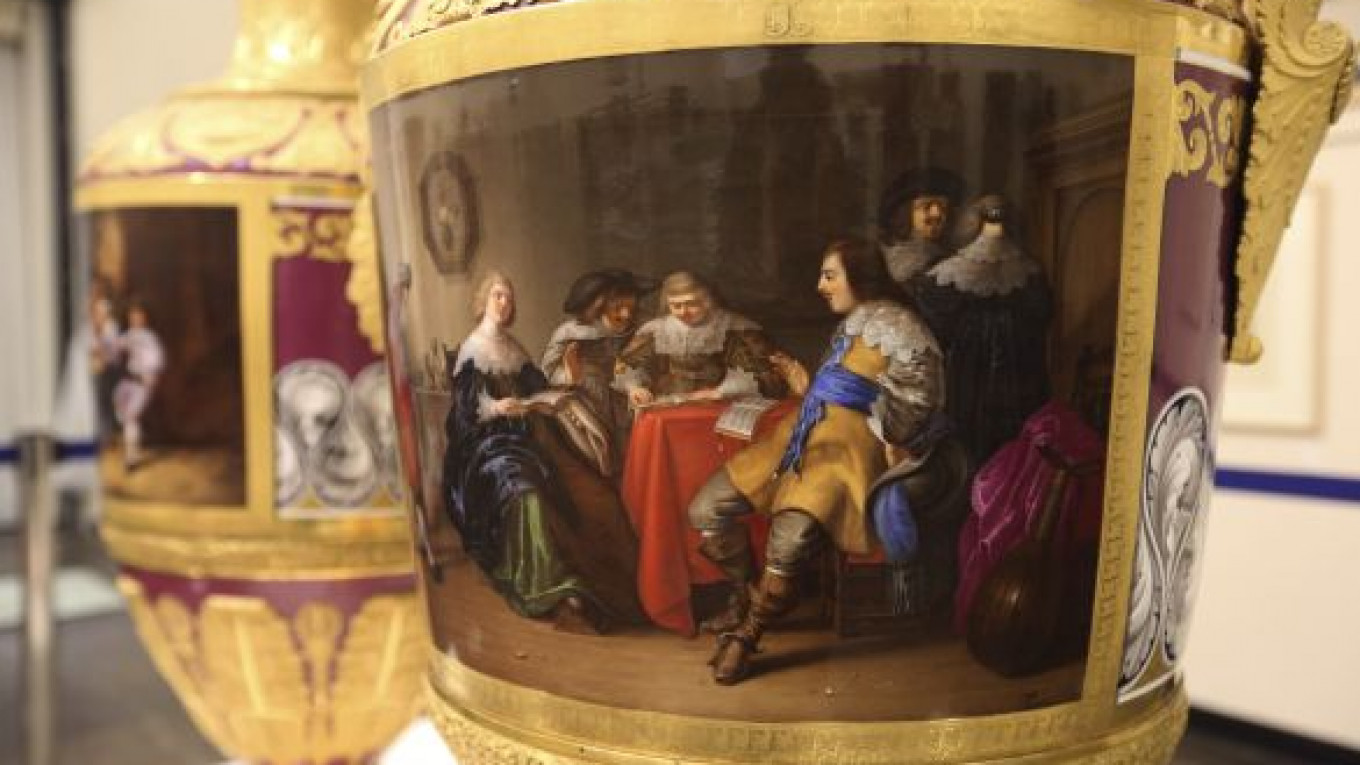DALLAS — Randy Buttram never gave much thought to the two 4 1/2-foot tall ornate vases that graced the elegant main entrance of his grandparents' Oklahoma City mansion and later were displayed around a fireplace facade at his parents' home.
The vases, which had been packed away for about a decade, turned out to be rare items from Russia dating back nearly two centuries to the reign of Nicholas I.
They also carried immense value, fetching $2.7 million last week in a private sale about a week before they were to be auctioned.
Buttram, 66, of Oklahoma City, remembers as a young boy playing at his grandparents' sprawling Italian Renaissance mansion that included a bowling alley in the basement. He said that the vases were part of the decor in an entryway so grand, complete with twin staircases, that they did not particularly stand out.
A pair of 19th-century vases made by Russia's Imperial Porcelain Factory are sold after having been stored in cardboard boxes for years.
"To me as a child they were just there and that's all," Buttram said. "We did a lot of roughhousing in the house. We're lucky nobody knocked them over."
Officials with Dallas Auction Gallery were evaluating items inherited by Buttram and his brother at their late parents' home when they noticed the top portion of one of the vases lying on a bed had the blue marking of Russia's Imperial Porcelain Factory used during the reign of Nicholas I and the date 1833 printed on it.
The pieces of the vases, which are designed to be disassembled for moving and storage, had been mostly stored in cardboard boxes.
"We saw that and immediately recognized it as: 'This is unbelievable,'" said Scott Shuford, president of the Dallas Auction Gallery, which conducted the sale. "I think our eyes kind of bulged out a little bit."
Shuford said the vases generated interest from all over the world in the time leading up to the April 17 auction. He said the buyer wished to remain anonymous. The pre-auction estimate for the vases was $1 million to $1.5 million.
As an adult, Buttram began to suspect the vases likely did have some value, but never did he imagine just how much.
Buttram's grandparents, Frank and Merle Buttram, bought the vases in 1928 from the Bernheimer Gallery in Munich while traveling through Europe. Frank Buttram, an Oklahoma native, founded Buttram Petroleum Co., which is still in the family and is now called Buttram Energies Inc.
After the deaths of his grandparents the estate was split between their five children and the vases were among items that went to Randy Buttram's father, Dorsey Buttram. When Randy Buttram's parents moved to a smaller home about a decade ago, the vases were stored away. After the death of his mother in November 2011 following his father's 2006 death, Buttram and his brother began to sort through what might be worthy of auction, including the vases.
Buttram said it had been interesting to look through his grandmother's detailed records of purchases on their travels, which included everything from the vases to two pairs of boys' silk pajamas bought in China.
The auction house consulted with the Russian porcelain curator at the State Hermitage Museum in St. Petersburg to confirm that the vases were indeed produced by the Imperial Porcelain Factory, founded in 1744 to produce items for the Russian royal family.
The auction house said that the research by the curator showed that one vase features a copy of the "The Concert" by Dutch painter A. Palamedes, an artwork from the 1600s currently on display in the Hermitage. Records show the painting was sent to the porcelain factory in 1832 to make a copy on the vase. Experts were unable to identify the painting that was copied on the second vase.
Shuford said they were unable to determine who the vases belonged to in Russia, and it is not known how they ended up at the Munich gallery. He said that after the Communists seized power in Russia in 1917, items like the vases were often sold off by the new Soviet government.
Buttram's grandparents' mansion located in the Oklahoma City enclave of Nichols Hills was an art museum for a time but is now privately owned again.
As for keeping them, Randy Buttram said he never gave that possibility much thought.
"I certainly really don't have any room for them at my house," he said.
A Message from The Moscow Times:
Dear readers,
We are facing unprecedented challenges. Russia's Prosecutor General's Office has designated The Moscow Times as an "undesirable" organization, criminalizing our work and putting our staff at risk of prosecution. This follows our earlier unjust labeling as a "foreign agent."
These actions are direct attempts to silence independent journalism in Russia. The authorities claim our work "discredits the decisions of the Russian leadership." We see things differently: we strive to provide accurate, unbiased reporting on Russia.
We, the journalists of The Moscow Times, refuse to be silenced. But to continue our work, we need your help.
Your support, no matter how small, makes a world of difference. If you can, please support us monthly starting from just $2. It's quick to set up, and every contribution makes a significant impact.
By supporting The Moscow Times, you're defending open, independent journalism in the face of repression. Thank you for standing with us.
Remind me later.






